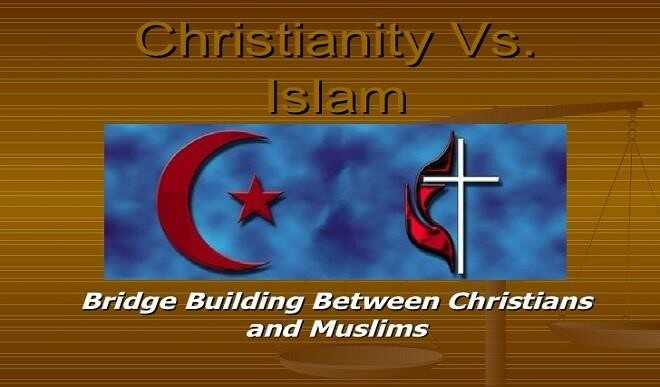By Jamal Badawi
With nearly one billion followers each, Islam and Christianity are major religions that influence the thinking and values of over 40 percent of the World population.
While there are theological differences, some of which might be significant, there are nonetheless other important areas of belief that are shared by both communities: belief in Allah, or God; belief in revelation, in prophets, in the Holy Books of Allah; in the hereafter and in a divinely inspired moral code organizing and regulating human life during our earthly journey to eternity.
Muslim-Christian dialogue
For the Muslim, constructive dialogue is not only permitted, it is commendable. In the Qur’an we read, ‘Say, ‘O people of the book’ (a term which particularly refers to Jews and Christians) ‘come to common terms as between us and you: that we worship none but Allah; that we associate no partners with Him (in His powers and divine attributes); that we erect not from among ourselves lords and patrons other than Allah.’ If then they turn back say you ‘Bear witness that we are Muslims.’ (Bowing) to the will of God.” (al-i-Imran;3:64)
The methodology of that dialogue is also explained in the Qur’an; “Invite (all) to the way of your Lord with wisdom and beautiful exhortation, and argue with them in ways that are best.’ (al-Nahl; 16,125).
A prerequisite for any constructive dialogue is that both communities should not learn about each other through sources that are unsympathetic, critical, or even hostile: they should rather try to formulate an honest idea as to how the other faith is seen in its own authentic scriptures and as practiced by those who are truly committed to it.
This need is even more significant in the case of the Muslim-Christian dialogue. The average Christian has heard of or has read about Islam mostly through writers who have had colonial or missionary motives, which might have given a certain slant to their interpretation of Islam to the western mind.
Now I’d like to share with you five basic areas, consideration of which is imperative in any Christian-Muslim understanding: the meaning of the term “Islam”; the meaning of the term “Allah”; the nature of the human; the relationship between the human and Allah; the question of accountability, and finally, some conclusions pertaining to bridge building between Muslims and Christians.
Meaning of ‘Islam’: Taking the term “Islam,” it is important to emphasize that it is not derived from the name of any particular person, race, or locality. A Muslim considers the term used by some writers, “Mohammedanism,” to be an offensive violation of the very spirit of Islamic teaching.
The Prophet Muhammad (pbuh) is not worshipped, nor is he regarded as either the founder of Islam or the author of its Holy Book, the Qur’an.
The term “Islam” is given in more than one place in the Qur’an itself. It is derived from the Arabic root (SLM) which connotes “peace” or “submission.” Indeed, the proper meaning of “Islam” is the attainment of peace, both inner and outer peace, by submission of oneself to the will of Allah. And when we say submit, we are talking about conscious, loving and trusting submission to the will of Allah, the acceptance of His grace and the following of His path.
In that sense the Muslim regards the term Islam, not as an innovation that came in the 7th Century, Christian era, with the advent of the Prophet Muhammad, but as the basic mission of all the prophets throughout history. That universal mission was finally culminated and perfected in the last of these prophets, Prophet Muhammad, peace be upon them all.
Islamic monotheism: The next essential concept that needs to be clarified is the term “Allah” What does it mean? It should be emphasised first that the term “Allah” has no connotation at all of a tribal god, an Arabian or even a Muslim god. The term “Allah’ in Arabic simply means the One and Only True, Universal God of all.
To think that Allah is different from God, with a capital ‘G’ is no more valid than saying the French Christians worship a different god because they call him “Dieu”.
What are the basic attributes of Allah? The Qur’an mentions the “most beautiful names” (or attributes) of Allah. Instead of enumerating them all, let’s examine a few. Some attributes emphasize the transcendence of Allah. The Qur’an repeatedly makes it clear that Allah is beyond our limited perception. “There is nothing whatever comparable unto Him.” (al-Shura; 42:1 1) “No vision can grasp Him, but His grasp is over all vision.” (al-An’am; 6:103).
A Muslim never thinks of God as having any particular image, whether physical, human, material or otherwise. Such attributes as “The Perfectly-Knowing,” “The Eternal,” “The Omnipotent,” “The Omnipresent,” “The Just,” and “The Sovereign” also emphasize transcendence. But this does not mean in any way that for the Muslim, Allah is a mere philosophical concept or a deity far removed.
Indeed, alongside this emphasis on the transcendence of Allah, the Qur’an also talks about Allah as “personal” God who is close, easily approachable, Loving, Forgiving and Merciful. The very first passage in the Qur’an, which is repeated dozens of times, is -In the name of Allah, Most Gracious, Most Merciful . . . .’
The Qur’an tells us that when Allah created the first human “He breathed into him something of His spirit,” (al- Sajdah; 32:9) and that “Allah is closer to the human than his jugular vein.” In another beautiful and moving passage we are told, “When my servants ask you (O Muhammad) concerning me, then surely I am near to them. I listen to every suppliant who calls on Me. Let them respond to My call and obey My command that they may be led aright.”
For the Muslim, monotheism does not mean simply the unity of God, because there can be different persons in unity. Monotheism in Islam is the absolute Oneness and Uniqueness of Allah, which precludes the notion of persons sharing in Godhead.
The opposite of monotheism in Islam is called in Arabic “shirk,” association of others with Allah. This includes not only polytheism, but also dualism (believing in one God for good or light and another for evil or darkness).
The concept of “shirk’ also includes pantheism, the idea that God is in everything. All forms of God-incarnate philosophies are excluded by Islam’s monotheism, as is blind obedience to dictators, to clergy, or to one’s own whims and desires.
These all are regarded as forms of “associating” others with Allah (shirk), whether by believing that such creatures of Allah possess divinity or by believing that they share the Divine Attributes of Allah.
*This piece earlier appeared on Daily Trust.




